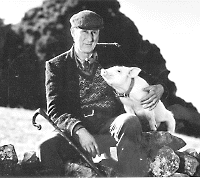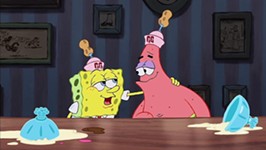Scanlines
Animal Farm
Fri., Aug. 29, 1997
With Gordon Heath and
Maurice Denham
Babe
D. Chris Noonan (1995)
With James Cromwell, Magda Szubanski, Christine Cavanaugh, Miriam Margolies, Danny Mann, and Hugo Weaving
|
Farmer Hoggett (James Cromwell) and the pig who wanted to be a sheepdog. The genuinely charming Babe has a timeless quality to it that should make it as enjoyable in 10 years as tonight. |
In Babe, pigs are shown in an altogether more favorable light. Orwell's cynical vision is archly rebuked in this artfully shot tale of a pig who wants to be a sheepdog. Here the charismatic swine remains true to his egalitarian principles, and over the course of the narrative, the farm animals achieve the communitarian democracy Orwell's beasts only dream of: from each according to his ability, to each according to his need. Here the transgression of traditional barnyard roles is successful and the political climate optimistic. Moreover, Babe moves away from the "four legs good, two legs bad" reductionism of Animal Farm, which, in its allegorical simplicity, cannot afford the nuanced treatment of quadruped-biped relations that Babe offers. On the whole, Babe provides a stunning revisionist take on barnyard politics, and may change the whole way we view pigs politically. As with all trenchant academic work, this conclusion invites further research: The pigsty is fertile ground indeed. Sadly, my scope is necessarily limited, and I must leave it to future scholars to dissect power relations in Charlotte's Web or examine the subversion of gender roles in Porky and Petunia. But let no scholar turn away from these questions in disdain, for when pigs speak, they speak volumes.
-- Jay Hardwig
Streetfight
D: Ralph Bakshi (1974)
with Scatman Crothers, Charles Gordone, Philip Michael Thomas,
and Barry White.
What's the best blaxploitation movie ever? Classicists prefer Sweet Sweetback's Baadasssss Song, purists admire The Mack, and connoisseurs lean towards Rudy Ray Moore's Dolemite trilogy. But not even these masterworks can match the attitude, style, and sheer funky genius of Ralph Bakshi's Streetfight, which also happens to be one of the best animated features ever made in this country. Scatman Crothers narrates this subversive modernization of Uncle Remus' (and Disney's) Song of the South. In this version, Brother Rabbit (Philip Michael Thomas), Brother Fox (Charles Gordone), and Brother Bear (Barry White -- Jesus, what a great fucking cast!) head North after a bloody shoot-out with some redneck cops. They hit Harlem, and Brother Rabbit rises, Scarface-style, to become the biggest player in history. He uses many of his classic tricks (remember the briar patch? the tar baby?) to muscle in on both the Mafia and a Sharptonesque preacher who's selling Revolution to the people. Streetfight uses its own "cartooniness" to match the incendiary rhetoric, profane humor, and raw sex and violence of the finest blaxploitation. Bakshi floods his movie with racial caricatures that push beyond offensiveness into surrealism. He catalogues the grotesque legacy of American culture in general and Hollywood in particular, exploring the very real ways that movies (all movies, including this one) continue to exploit blacks for the purposes of entertainment. -- Chris Baker







